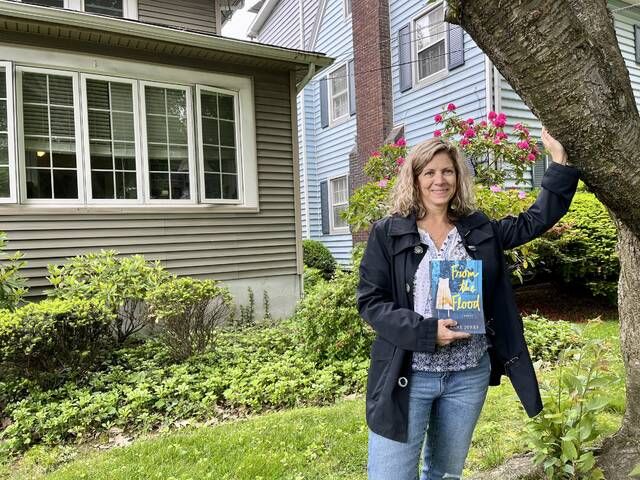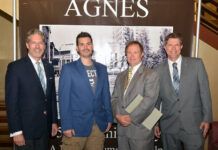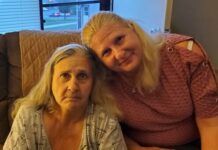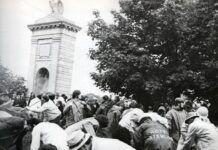
Suzanne Jones holds a copy of her Agnes memoir, ‘From the Flood,’ outside the Kingston home where her family eventually settled after several years of upheaval following the 1972 disaster.
Roger DuPuis | Times Leader
Wilkes-Barre native’s new memoir views flood, recovery through a child’s eyes
Click here to subscribe today or Login.
Today, Suzanne Jones is a trauma recovery specialist working in the Boston area. In 1972, she was a six-year-old whose Wilkes-Barre home was inundated by Agnes’ muddy floodwaters.
Despite that, her perspective on the disaster and its aftermath focuses on the positive ways in which the flood changed life for herself and her family.
“It was not traumatic for me,” Jones said of the Agnes ordeal in a wide-ranging interview recently over coffee during a visit home to the Wyoming Valley.
“It was traumatic for my parents. We ended up living in this dismal pea-soup green trailer, but we had woods and a golf course we could go play on and we were just as happy as can be,” Jones said. “When you’re six-years-old, you’re really concerned about other things like your sister telling on you or it not being fair that she got the toy you wanted.”
Perhaps more importantly, living in the trailer brought Jones and her family in contact with a new group of friends who broadened their horizons and created new, happy memories during an otherwise stressful time.
Jones’ recollections of her family’s Agnes odyssey — from Wilkes-Barre, to the trailer off the Sans Souci Parkway, and eventually to Kingston — are the subject of a new memoir published this month, “From the Flood,” which can be found on Amazon.com.
It is fictionalized — as Jones pointed out, six-year-olds don’t exactly keep records of dialogue — but built around the actual events of her family’s life in the Agnes era.
She will participate in a reading and book-signing at 6:30 p.m. Wednesday at Barnes & Noble in the Arena Hub Plaza, and will be discussing the book at the Osterhout Free Library at 5 p.m. June 27.
‘We lost our entire home’
Jones’ family lived on Birch Street in Wilkes-Barre when the flood hit.
“It’s interesting because my father, I don’t know, maybe 10 years ago, had asked us ‘what were your favorite childhood years?’ All of us said when we lived in the trailer after the flood,” she recalled.
“And he couldn’t believe it because that was the worst time of his life. He lost his business and we lost our entire home because the river went all the way up to the roof of our home.”
The book’s dedication underscores this: “To Mom and Dad for making the worst years of your lives the best years of ours.”
Her memories of the flood itself are less pleasant, however.
“I remember being woken up. I remember my brother crying. He was little, he was three. I remember him screaming.”
Like many flood-hit families, the Joneses spent time living with relatives — first with an aunt on Lloyds Lane in Wilkes-Barre, where they were surrounded by family, “feeling safe and loved.” From there, Jones recalls, they went to her grandfather’s house, which was “kind of quiet.”
There was a place the Jones children were being shielded from, however.
“They didn’t want to take us back to see the house because they wanted us to remember the house, you know, the way it was. But at a certain point, my dad did take us down to see the house. I remember that,” Jones said quietly.
Years later, Jones heard from her father how arduous the cleanup had been.
“He just said it was unfathomable to imagine that it would ever get cleaned up. He told me stories of how you had to fight for stuff, like squeegees or the right tools just to clean your house.”
Eventually, the family moved into a trailer near where the family business, Bedwick & Jones Printing, was constructing a new building out of the flood zone. The trailer was among others on land owned by a golf course where her dad was a member.
“What I learned later was that they were giving people trailers, but they didn’t give them a place to put ’em,” Jones said. “So you can get a trailer, but if you didn’t have a place to put it, you were outta luck.”
A new way of life
Life in the trailer was transformative.
“My parents were sort of the ’50s generation. My mom was a conservative housewife. You know, they had the gender-specific roles,” Jones said.
“But when we got to the trailer these families around them were just enough younger than my parents, that they were sort of more ’60s and ’70s generation. My parents went through a complete transformation because they met these people that became their friends,” she said.
Life for the adults and children differed, of course — a key theme in Jones’ narrative.
“There was a gang of kids there that just became our best friends, and we played every day. We played house a lot,” she said. “And all of our games of house revolved around some sort of natural disaster, like a flood coming or a tornado, you know? That’s what kids do, you know, we just kind of made a game of it all.”
For her mother in particular, however, the new life led to significant changes — especially after making friends with a young nurse and her friends, who opened her eyes to new possibilities, new ways of thinking at a time when married women still weren’t allowed to have their own names on their credit cards, among so many other societal limitations.
“So once my mom saw that there were women that had jobs and were independent and didn’t rely on their husbands for things, she decided she wanted to be a nurse,” Jones said.
It proved to be a critical decision, and one that came at a time of other changes.
“You know, so she went to school, and she was pregnant with her fourth child,” Jones said. “Life just completely changed. And that wouldn’t have happened if the flood hadn’t happened.”
How did that play out in the household?
“My dad went with it,” Jones said. “I think at first it was sort of like, ‘wait a minute, like what’s happening,’ you know? But he really rolled with it and he started taking on roles that weren’t typically considered father roles. Like he did a lot of the staying home with my younger sister when she was a baby, because my mom was at school.”
Some of the parenting also was done by the community.
“My parents knew if we went out of the trailer there would be some adults around that would know what we were up to,” Jones said.
One of them was a teenage babysitter, Charlene, who “was like the pied piper” to the kids in the trailers.
Moving up the mountain
The Joneses eventually built a new home in Mountain Top, which took about two years — hence their extended stay in the trailer.
Once they got there, they realized something wasn’t right.
“Well, when we moved up there, unbeknownst to us kids after two weeks, my parents decided they just did not want to live there,” Jones said. “After living two years in a place where it was like almost like communal living, it wasn’t the same.”
They let the children finish that school year, but the sense of isolation, and lack of community, ultimately led them to Gibson Avenue in Kingston, where Jones grew up — in a neighborhood whose sense of community stays with her today.
Following our interview at Ollie’s Restaurant in Edwardsville, Jones and a reporter visited the Kingston home for a photo, and a lot of reminiscing — about changes to the home since her parents sold it roughly two decades ago, as well as which neighbors were still living nearby.
Moving there was, Jones acknowledges, a risk for her parents: The Kingston house was in the flood zone. It was also situated in a tight-knit neighborhood that helped rekindle some of the camaraderie they had known in the trailer.
“So, you know, they were very clearly weighing, do we want to prioritize safety, or is community more important than that,” she said.
“And they decided that community was more important.”
***
Visit our Agnes at 50 online archives: https://www.timesleader.com/agnes







